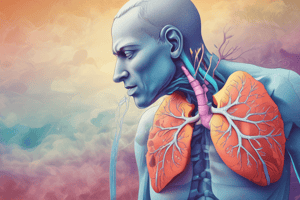Podcast
Questions and Answers
Which of the following is NOT a trigger for asthma attacks?
Which of the following is NOT a trigger for asthma attacks?
- Allergens
- High humidity (correct)
- Exercise
- Cold, dry air
The primary characteristic of asthma's late phase response is bronchial smooth muscle contraction.
The primary characteristic of asthma's late phase response is bronchial smooth muscle contraction.
False (B)
What are the hallmark features of asthma?
What are the hallmark features of asthma?
Airway inflammation and airway hyper-responsiveness.
Chronic obstructive pulmonary disease (COPD) is primarily caused by _____ and is characterized by persistent airflow limitation.
Chronic obstructive pulmonary disease (COPD) is primarily caused by _____ and is characterized by persistent airflow limitation.
Match the following medications with their category:
Match the following medications with their category:
Which of the following is NOT a cause of Chronic Obstructive Pulmonary Disease (COPD)?
Which of the following is NOT a cause of Chronic Obstructive Pulmonary Disease (COPD)?
Symptoms of COPD include sudden onset and improvement in breathing difficulty.
Symptoms of COPD include sudden onset and improvement in breathing difficulty.
Name one complication of Chronic Obstructive Pulmonary Disease (COPD).
Name one complication of Chronic Obstructive Pulmonary Disease (COPD).
In COPD, airflow limitation can lead to __________ and gas exchange abnormalities.
In COPD, airflow limitation can lead to __________ and gas exchange abnormalities.
Match the following classifications of COPD severity with their descriptions:
Match the following classifications of COPD severity with their descriptions:
Flashcards are hidden until you start studying
Study Notes
Obstructive Pulmonary Diseases
- The most common chronic lung diseases include asthma and COPD.
- Obstructive pulmonary diseases are defined as those that increase airflow resistance due to airway obstruction or narrowing.
Asthma
- A chronic inflammatory disorder of the airways.
- Characterized by airway hyper-responsiveness.
- Triggers include allergens, exercise, respiratory infections, nasal and sinus problems, medications and food additives, cold, dry air, stress, hormones and menses, Gastroesophageal reflux disease (GERD), and occupational exposure.
Asthma Pathophysiology
- The hallmarks of asthma are airway inflammation and hyper-responsiveness.
- Two types of asthmatic responses occur: early phase and late phase.
- The early phase response is triggered by allergens, irritants, or cold air, and results in bronchoconstriction and increased mucus production.
- The late phase response is more severe and is characterized by sustained inflammation, infiltration of eosinophils and neutrophils into the airways, and increased airway hyperresponsiveness.
Asthma Clinical Manifestations
- The characteristic clinical manifestations of asthma are wheezing, cough, dyspnea, and a sensation of chest tightness after exposure to a precipitating factor or trigger.
Asthma Diagnosis
- Diagnosis is based on characteristic symptoms, variable airflow obstruction, and pulmonary function tests.
Asthma Treatment
- Interprofessional approach to management, including medication therapy and lifestyle modifications.
- Medications include relievers and controllers.
- Relievers include short-acting and long-acting β2-adrenergic agonists, anticholinergic medications, and methylxanthines.
- Controllers include corticosteroids, antileukotrienes, and biological therapies such as anti-immunoglobulin E therapy.
Chronic Obstructive Pulmonary Disease (COPD)
- A respiratory disorder primarily caused by smoking.
- Characterized by persistent airflow limitation, usually progressive, often associated with an enhanced chronic inflammatory response in the airways and lung due to noxious particles or gases.
- Symptoms include dyspnea, difficulty breathing, and shortness of breath, usually insidious in onset and progressive.
- Past definitions of COPD included chronic bronchitis and emphysema.
COPD Causes
- Tobacco smoke
- Occupational chemicals and dust
- Infections
- Heredity
- Aging
COPD Pathophysiology
- Chronic inflammation found in the airways, lung parenchyma, and pulmonary blood vessels.
- Often have characteristics of emphysema and chronic bronchitis.
- Airflow limitation, air trapping, gas exchange abnormalities, mucus hypersecretion, pulmonary hypertension, and systemic abnormalities are among the various disease processes that occur in COPD.
COPD Classification
- Classified based on severity, ranging from mild to very severe.
- Classification considers symptoms, disability, and impairment of lung function.
COPD Complications
- Cor pulmonale
- Acute exacerbations of COPD
- Acute respiratory failure
- Depression and anxiety
Cor Pulmonale
- Right ventricular hypertrophy and dilation caused by pulmonary hypertension.
- A serious complication of COPD.
COPD Clinical Assessment
- History and physical exam.
- Pulmonary function tests.
- Chest imaging.
- Blood tests.
Studying That Suits You
Use AI to generate personalized quizzes and flashcards to suit your learning preferences.




